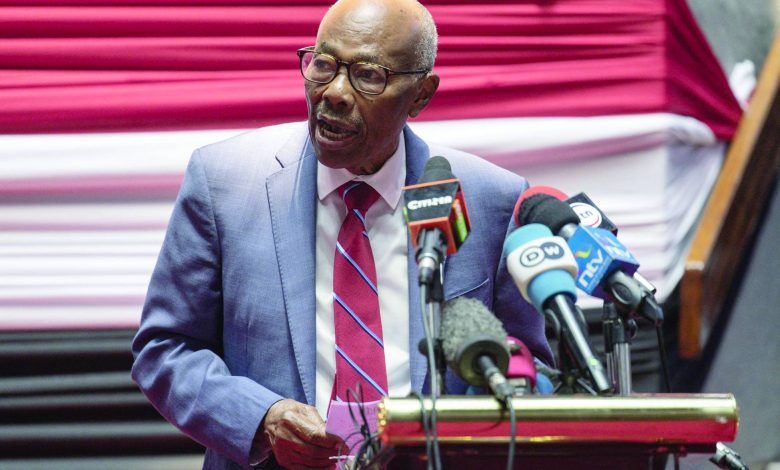Deep Divisions Rock Sudan’s Largest Political Party

Sudan Events – Agencies
Internal disputes have erupted within the National Umma Party, escalating from internal disagreements to a public war of statements between party institutions. This turmoil led to the dismissal of the acting party leader, Fadlallah Burma Nasir, who removed his deputies, assistants, and advisors, including the party’s vice president, Maryam Al-Mahdi—the daughter of the party’s historic leader and the last democratically elected prime minister, the late Sadiq Al-Mahdi.
The acting party leader issued a decision restructuring the Presidency of the Party, which resulted in the dismissal of Maryam Al-Sadiq Al-Mahdi, Sadiq Ismail, Abdullah Al-Douma, and several assistants and advisors. He appointed senior party member Ibrahim Al-Amin as vice president and named eight presidential assistants, most notably Sadiq and Bushra, sons of the late Sadiq Al-Mahdi and brothers of Maryam, along with four advisors, including Al-Hadi Naqdallah.
The divisions intensified following the party leader’s signing of the Sudan Founding Alliance document with the Rapid Support Forces and other armed movements, as well as political parties and civil society organizations, in Nairobi, Kenya, on February 22. The document recognized the right of self-determination for Sudanese peoples and called for a secular and federal system of governance in the country—principles that the party’s Presidency Institution deemed a departure from its core values.
In response, the Presidency Institution, comprising the party’s vice presidents, assistants, and advisors, decided in February to remove Fadlallah Burma Nasir from his role as party leader and appointed Vice President Mohamed Abdullah Al-Douma as acting leader with the powers of an elected president.
In a statement, the institution argued that Nasir was an acting leader with legitimacy based on mutual agreement, requiring him to make decisions through the Presidency Institution, which also holds the authority to hold him accountable. It accused him of attending meetings related to the Sudan Founding Charter and signing it without authorization or even notifying the institution. The statement further asserted that the charter’s endorsement of secularism and self-determination contradicts the party’s principles, warning that such positions could incite religious discord and contribute to Sudan’s fragmentation.
On the other hand, the head of the party’s Political Bureau, Mohamed Al-Mahdi Hassan, issued a statement rejecting the dismissal of the acting leader. He argued that the party leader was appointed by the Political Bureau, not by his deputies, assistants, or advisors, and thus they lacked the authority to remove him. He emphasized that party institutions, not just the Presidency Institution, have decision-making power and reaffirmed that the Political Bureau is the party’s highest authority, performing the functions of the Central Committee and General Congress.
Hassan explained that the Presidency Institution is a horizontal body formed under the authority of the party leader, who appoints and dismisses its members. He asserted that the vice presidents, assistants, and advisors do not have the power to dismiss or remove the leader under the party’s constitution, and that the accusations against him are political judgments that should be addressed by the party’s institutions.
Following the sudden passing of the party’s historic leader, Sadiq Al-Mahdi, due to COVID-19 in November 2020, his first deputy, retired General Fadlallah Burma Nasir, was appointed as acting leader until the General Congress could be held within a year. However, the military coup on October 25, 2021, which toppled the transitional government led by Abdalla Hamdok, followed by the outbreak of war in April 2023, prevented party conferences from being convened, leaving Nasir in leadership.
After the party signed the charter of the Democratic Civil Forces Coordination (Tagaddum), which calls for an end to the war under the leadership of former Prime Minister Abdalla Hamdok, divisions emerged within the Al-Mahdi family. One faction, led by party Vice President Sadiq Ismail, aligned itself with the army, while another, led by Al-Wathiq Al-Berair (Al-Mahdi’s son-in-law) and Al-Sadiq (Al-Mahdi’s son), took a different stance.
The signing of the Sudan Founding Alliance document with the Rapid Support Forces introduced a third faction within the Al-Mahdi family—one led by the party’s Secretary-General and Al-Mahdi’s son-in-law, who opted to remain in the Samood civil coalition, which rejects alliances with either warring party, distancing themselves from the acting party leader’s stance.
The National Umma Party is Sudan’s largest political party. In the last democratic elections of 1985, it secured the largest parliamentary bloc, leading to the appointment of its then-leader, Sadiq Al-Mahdi, as prime minister. However, his government was overthrown in a military coup led by Omar Al-Bashir on June 30, 1989.



